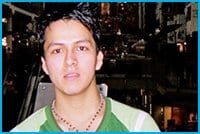Alvaro Orozco, the Nicaraguan refugee who was denied status because a refugee board member didn’t believe that he was gay, will be allowed to remain in Canada until Aug 9.
In February the Department Of Justice granted Orozco, 21, a two-month stay of his deportation order amid widespread media attention about his case.
“I think they recognized that April was a very short timeframe… that to have these applications filed and an outcome to move forward they need more time,” says legal researcher Andrew Hwang, in the office of Orozco’s lawyer El-Farouk Khaki.
“I think it’s really the least they could do, facing what he was facing.”
Orozco was denied refugee status last October after refugee board member Deborah Lamont ruled that Orozco “did not pursue same-sex relationships in whatever capacity… because he is not a homosexual.”
Orozco’s refugee claim was based on the grounds that he’d be persecuted on the basis of his sexual orientation if sent back to Nicaragua. Same-sex relationships are illegal in Nicaragua and can result in up to three years in prison.
An application made by Khaki’s office to reopen Orozco’s case was recently dismissed. Hwang says the decision wasn’t completely unexpected.
“The nature of such an application is essentially to ask the IRB [Immigration And Refugee Board Of Canada] to rule that it had denied natural justice, ie procedural fairness, to a claimant…. Aside from technicalities I generally haven’t seen the IRB rule negatively on itself on such a case.”
In the meantime, a second pre-removal risk assessment was conducted for Orozco at the request of Khaki’s office; the resulting report is expected in the next week.
“He’s going to have a heightened risk [since his last assessment] in Nicaragua,” says Hwang, citing media coverage in Nicaragua about Orozco’s refugee case. “Before they didn’t know, but now everybody knows he’s gay [and he’s] also percieved as someone who’s given Nicaragua bad press.”
Lastly, Khaki’s office is requesting that Orozco be allowed to file an immigration application to allow him residency based on humanitarian and compassionate grounds.
“Normally if you apply for permanent residence they require that you apply from your home country,” says Hwang. “Orozco may be allowed to apply for permanent residency based on two things. The first is undue excessive hardship, the fact that he could face persecution [if he returns to Nicaragua]… and the second is that he has established himself in Canada. He’s worked here, he has friends.”
Orozco, who is currently studying to improve his English while he awaits a renewal of his work permit, says that having his case so widely known has had a negative impact on his well-being.
“It’s so hard because you know everybody knows my personal life here in Canada, in my country [Nicaragua], in many countries in the world,” says Orozco. “They know my life and my case. It’s not easy to show in public all of your life… but this is the only way that I can show to immigration that my history of my life is true, that I’m gay.”

 Why you can trust Xtra
Why you can trust Xtra


